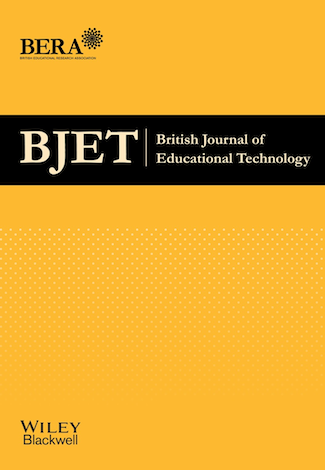An issue of British Journal of Educational Technology has just been added to EdITLib.
The table of contents is available here: http://www.editlib.org/j/BJET/v/46/n/6//
Contents
Construction of a digital learning environment based on cloud computing
Jihong Ding, Caiping Xiong & Huazhong Liu
Constructing the digital learning environment for ubiquitous learning and asynchronous distributed learning has opened up immense amounts of concrete research. However, current digital learning environments do not fully fulfill the … More
Intensive scaffolding in an intelligent tutoring system for the learning of algebraic word problem solving
José Antonio González‐Calero, David Arnau, Luis Puig & Miguel Arevalillo‐Herráez
The term intensive scaffolding refers to any set of conceptual scaffolding strategies that always allow the user to find the solution to a problem. Despite the many benefits of scaffolding, … More
Internal structure of virtual communications in communities of inquiry in higher education: Phases, evolution and participants' satisfaction
Elba Gutierrez‐Santiuste & Maria‐Jesus Gallego‐Arrufat
This study investigates the phases of development of synchronous and asynchronous virtual communication produced in a community of inquiry (CoI) by analyzing the internal structure of each intervention in the … More
Assessing university students' perceptions of their Physics instructors' TPACK development in two contexts
Yahui Chang, Syh‐Jong Jang & Yang‐Hsueh Chen
Technological Pedagogical and Content Knowledge (TPACK) has been gaining traction among educational researchers; however, studies documenting university students' perceptions of their teachers' TPACK remain limited. This study intends to investigate … More
How and why academics do and do not use iPads for academic teaching?
Olaojo Aiyegbayo
This paper evaluated how academics, at a mid-sized UK university, used their iPads for teaching. The data were gathered using both quantitative and qualitative methods. Eighty-four academics completed a survey … More
Creation of reusable open textbooks: Insights from the Connexions repository
Carlos Rodriguez‐Solano, Salvador Sánchez‐Alonso & Miguel‐Angel Sicilia
Open textbook initiatives have appeared as an alternative to traditional publishing. These initiatives for the production of alternatively copyrighted educational resources provide a way of sharing materials through the Web. More
From passive to active: The impact of the flipped classroom through social learning platforms on higher education students' creative thinking
Abdulrahman M Al‐Zahrani
This study aimed to investigate the impact of the flipped classroom on the promotion of students' creative thinking. Students were recruited from the Faculty of Education at King Abdulaziz University … More
Papier-mach(in)e: Thinking with “sticky” paper in the cloud
Judith Enriquez‐Gibson
There is nothing less about paper and its use when it comes to academic study as we experience increasingly converging media spaces and functionalities of online applications within the screens … More
Children learning to use technologies through play: A Digital Play Framework
Jo Bird & Susan Edwards
Digital technologies are increasingly acknowledged as an important aspect of early childhood education. A significant problem for early childhood education has been how to understand the pedagogical use of technologies … More
Effects of degree of segmentation and learner disposition on multimedia learning
Peter E. Doolittle, Lauren H. Bryant & Jessica R. Chittum
The construction of asynchronous learning environments often involves the creation of self-paced multimedia instructional episodes that provide the learner with control over the pacing of instruction (segmentation); however, does the … More
Facebook and classroom group work: A trial study involving University of Botswana Advanced Oral Presentation students
Joel M. Magogwe, Beauty Ntereke & Keith R. Phetlhe
In the 21st century, the use of information technology in the classroom is advancing rapidly, especially in higher education. The Internet, through social networking, has made it possible for students … More
Developing a dynamic inference expert system to support individual learning at work
Yu Hsin Hung, Chun Fu Lin & Ray I. Chang
In response to the rapid growth of information in recent decades, knowledge-based systems have become an essential tool for organizational learning. The application of electronic performance-support systems in learning activities … More
Foundations of dynamic learning analytics: Using university student data to increase retention
Sara Freitas de, David Gibson, Coert Du Plessis, Pat Halloran, Ed Williams, Matt Ambrose, Ian Dunwell & Sylvester Arnab
With digitisation and the rise of e-learning have come a range of computational tools and approaches that have allowed educators to better support the learners' experience in schools, colleges and … More
Examining the characteristics of student postings that are liked and linked in a CSCL environment
Alexandra Makos, Kyungmee Lee & Daniel Zingaro
This case study is the first iteration of a large-scale design-based research project to improve Pepper, an interactive discussion-based learning environment. In this phase, we designed and implemented two social … More
Increasing performance by differentiated teaching? Experimental evidence of the student benefits of digital differentiation
Carla Haelermans, Joris Ghysels & Fernao Prince
This paper explores the effect of digital differentiation on student performance using a randomized experiment. The experiment is conducted in a second year biology class among 115 prevocational students in … More
On the use of extended TAM to assess students' acceptance and intent to use third-generation learning management systems
Salvador Ros, Roberto Hernández, Agustín Caminero, Antonio Robles, Isabel Barbero, Araceli Maciá & Francisco Pablo Holgado
Service-oriented e-learning platforms can be considered as a third generation of learning management systems (LMSs). As opposed to the previous generations, consisting of ad hoc solutions and traditional LMS, this … More
Exploring factors that influence adoption of e-learning within higher education
Emma King & Russell Boyatt
E-learning is increasingly adopted in the workplace for supporting professional development and continuing education; however, in higher education, the use of e-learning is predominantly used as a tool support teaching. … More
Online assessment of learning and engagement in university laboratory practicals
David E. Whitworth & Kate Wright
In science education, laboratory practicals are frequently assessed through submission of a report. A large increase in student numbers necessitated us adapting a traditional practical report into an online test … More
Making in-class skills training more effective: The scope for interactive videos to complement the delivery of practical pedestrian training
James Hammond, Tom Cherrett & Ben Waterson
Skills and awareness of young pedestrians can be improved with on-street practical pedestrian training, often delivered in schools in the UK by local authorities with the intention of improving road … More
Developing new teacher inquiry and criticality: The role of online discussions
Adam Unwin
This work concerns the professional development of UK teachers in their first year of teaching. It is interested in how the online discussions (ODs) these teachers undertook as part of … More


One thought on “British Journal of Educational Technology 46:6 Published on EdITLib”
Comments are closed.